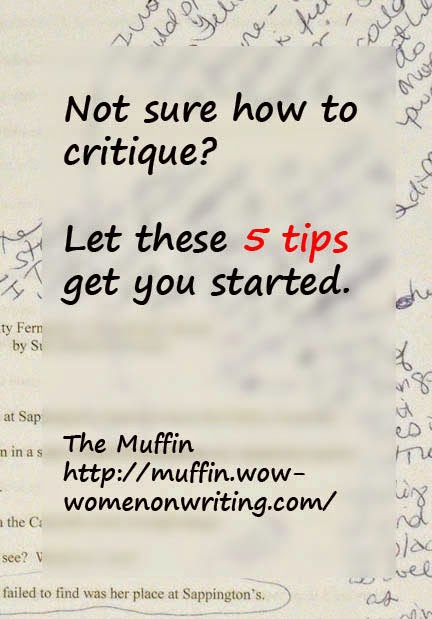| Online: | |
| Visits: | |
| Stories: |
How to Critique
I hope Cathy Hall’s recent post, The Critique Epiphany inspired those of you who don’t have critique groups to seek one out.
If you’re not sure how to critique, here are some tips to get your started.
- You may not have a lot of experience critiquing, but you do have experience reading. Essentially, that’s what you’re doing. The difference is that you get the chance to tell the author what you think . . . within reason.
- A good critique points out what works and what doesn’t. Start with what the author did right. Maybe she picked a topic you love or her description is so solid that you feel like you could walk into her setting. Tell her. Then you move on to what doesn’t work. She’ll be more ready to hear it now that you’ve put her at ease. Whew! She did something right.
- When you make suggestions for change, keep them fairly broad. You absolutely despise this writer’s dialogue. All of her characters, including the husband, the sons and the Seal Team (doesn’t every novel have a Seal Team?) all sound like fifteen year-old girls. That’s a problem but don’t underline all of the dialogue that doesn’t work. Mark a few lines then reflect on her “big picture.” “As much as I like the story, I’m having trouble telling the voice of one character from another.”
- Share What Has Worked for You. If you’ve also struggled to develop voice or setting or plot, share what worked for you. “You might try developing a vocabulary each character. It worked for me.” She might take your suggestion, but she might not.
- Remember, you are playing in someone else’s sandbox. This isn’t your story. It belongs to someone else. You’re only there because you’ve been invited over to play. Your opinions are just that. Your opinions. In my group, when we aren’t sure if we’re helping or just stirring things up, we point that out. “It’s still your sandbox. Not mine.”
It may take time before you feel comfortable critiquing the work of other writers. After all, it is a skill. Many writers are introverts and attending a critique group requires us to put ourselves out there, both by sharing our work and by sharing our ideas on the work of others.
That said, it is worth learning to do well. Friendships with other writers often grow out of critique groups and no one will understand you or your work better than someone else who writes.
–SueBE
Sue teaches our class, Writing Nonfiction for Children and Young Adults. The next session begins in October; places in the class are open.
(C) Copyright wow-womenonwriting.com
Visit WOW! Women On Writing for lively interviews and how-tos. Check out WOW!'s Classroom and learn something new. Find jobs on the Freelance Job Board. Enter the Quarterly Flash Fiction Contest. Open Now!
Source: http://muffin.wow-womenonwriting.com/2014/09/how-to-critique.html





